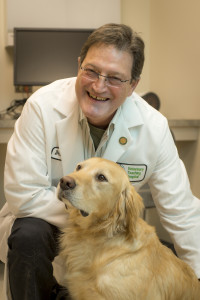Colorado State University’s Flint Animal Cancer Center is spearheading a first-of-its-kind workshop that will be held next week in Washington, D.C., to explore how the study of pets with naturally occurring cancer can inform the treatment of that disease in humans.

The June 8-9 workshop at the Keck Center of the National Academy of Sciences will be hosted by the National Cancer Policy Forum, which is part of the Institute of Medicine, the health division of the National Academies.
The event, titled “The Role of Clinical Studies for Pets with Naturally Occurring Tumors in Translational Cancer Research,” was conceived and proposed by CSU’s Flint Animal Cancer Center. It is co-sponsored by numerous veterinary colleges, medical schools, and other commercial and philanthropic stakeholders.
“The goal is to identify changes needed to improve our ability to coordinate the animal studies that we do with those conducted on human patients,” said FACC Director Rodney Page, who initiated the application to host the event.
From animals to people
Objectives of the conference include identifying ways to speed the transfer of successful cancer developments from companion animals to people, from infrastructure needs to the improvement of clinical trials.
“Due to the shorter lifespan of our pet dogs and cats, the time course for finding solutions to shared medical problems can be accelerated,” he said. “Many owners are unaware that their animals can be successfully treated, and they are even less likely to know that their pet’s treatment could potentially benefit both animal and human health.”
The event, the first Institute of Medicine workshop to be held on the subject, will be led by medical, scientific and policy leaders and will explore both the benefits and challenges of coordinating studies that aid multiple species. The workshop’s mandate is to review the pros, cons, gaps and best practices of translational clinical research.
Speakers from CSU will include Page, Professor Dan Gustafson and Associate Professor Douglas Thamm, all of the Department of Clinical Sciences.
Government regulators, medical doctors, veterinarians and other stakeholders will attend the conference, which will feature expert panels and audience participation. The event is free and open to the public. The Institute of Medicine will publish proceedings within a few months of the workshop.
To view the agenda, or to register to watch the conference streamed live, visit http://col.st/P5kjT.
The center
The Flint Animal Cancer Center, www.csuanimalcancercenter.org, is part of the CSU College of Veterinary Medicine and Biomedical Sciences. It is one of the nation’s premier veterinary cancer treatment centers for companion animals, providing state-of-the art diagnostics, treatments and cures for patients worldwide. It has also been recognized for the comparative study of the spontaneously occurring cancers that occur in both animals and man.
The Institute of Medicine, http://www.iom.edu, is an independent, nonprofit organization that works outside of government to provide unbiased and authoritative advice to decision-makers and the public. Its aim is to help those in government and the private sector make informed health decisions by providing evidence upon which they can rely.
The Institute of Medicine established the National Cancer Policy Forum to serve as a focal point and trusted venue for the engagement of national leaders to address high-priority policy issues in the nation’s effort to combat cancer. Participants represent clinicians, patients, researchers, professional and advocacy organizations, pharmaceutical manufacturers, and policy makers.